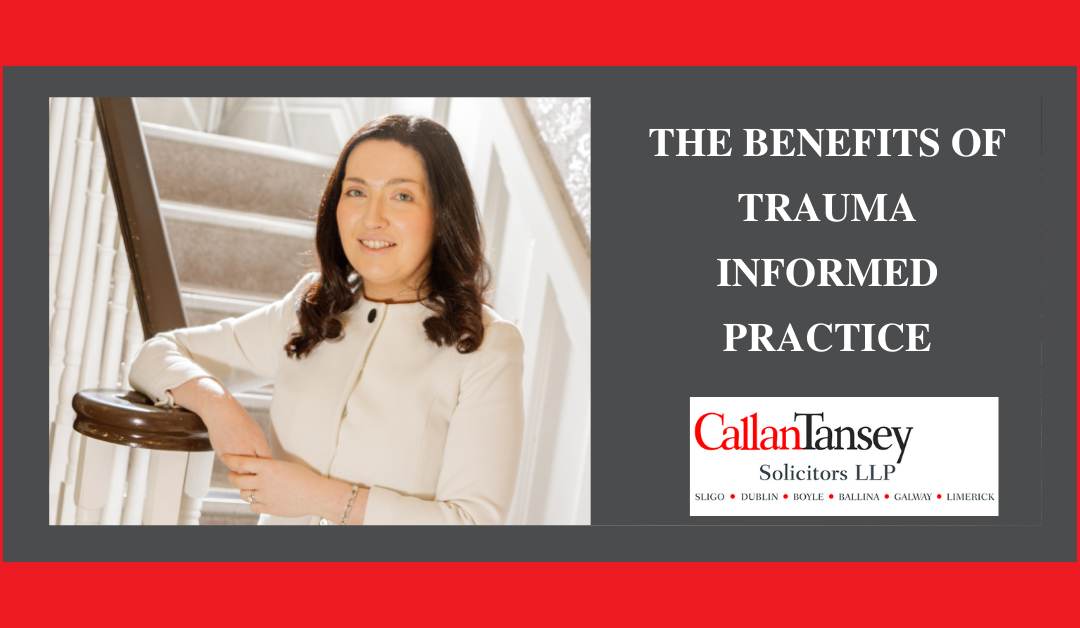Trauma informed practice elevates client care skills and helps solicitors connect with their clients, creating better legal outcomes and more robust advocacy.
Our Caroline McLaughlin, Partner in our Personal Injuries Litigation Department, participated in the recent Law Society of Ireland Summit on The Trauma Informed Practitioner. The aim of the Summit was to promote awareness of trauma and to gain skills to understand and assist clients during some of the most difficulty times in their lives. This is part of our continued development and implementation of trauma informed care at Callan Tansey Solicitors
What Is Trauma Informed Practice?
Trauma Informed practice focuses on both developing practitioner’s understanding of the lived experience of trauma and effectively intervening with those that have experienced trauma. A trauma informed practice aims to reduce re-traumatisation and recognise the role trauma plays in the solicitor-client relationship.
Clients Experience of Trauma
Clients frequently seek legal assistance at a time when they are highly vulnerable and emotional. When we meet clients they have already faced a battle, even before becoming involved in the battle of bringing a legal case. They may be facing the trauma of a single bereavement or multiple bereavements as a result of an accident. Perhaps they have been left with significant injuries from an incident which has left them unable to carry out their normal social activities, to earn a livelihood or live the life they should be living. For many this may not be the first trauma they have experienced during their lifetime.
Trauma-informed practice practically means integrating understanding of past and current experiences of trauma into solicitor-client relationships and case management. It requires making people feel safe and in control in environments that do not retraumatise.
Bringing Your Human To Work
We are all human beings who feel significant empathy towards our clients and the trauma they are facing whilst at the same time having to depart advice impartially in line with our professional standards. One speaker at the conference Melissa Rutherford, Director at Rutherford Sheridan Solicitors Glasgow summed up the practice of being a trauma informed practitioner by stating that practitioners “Bring [their] human to work”.
As practitioners we should be equipped to offer support, guidance and comfort throughout the legal process whilst maintaining professional standards. We should also be able to recognise the effects these traumatic experiences may have on their clients’ actions and behaviours.
As part of dealing with trauma for our clients we must also practice self-care and self-awareness so that we can show empathy, understanding and consistency in our approach to our clients. Trauma informed practice also gives solicitors an opportunity to reflect on the issues raised in each case and how they impact on their professional and personal experience.
How Trauma Informs the Solicitor-Client Relationship
In trauma informed practice the solicitor puts the realities of the client’s trauma experiences at the forefront in engaging with the client, and adjusts the practice approach informed by the individual client’s trauma experience. By explaining their role, the role of others in the court, and what can happen during the course of representation, solicitors can alleviate the stress and anxiety of the process.
We start our consultations with clients by explaining the nature of the meeting and providing as much information about what will happen to ease anxiety. By starting with transparency, the solicitor establishes trust with the client. When the client feels comfortable, they are more likely to share sensitive information that may be integral to their case. We can then provide proper referrals to additional services and better prepare cases for settlement or trial.
On completion of the trauma informed practitioner training Caroline McLaughlin commented, “I completed this training in the hope of gaining a deeper understanding of these traumas and how we can support our clients and to educate our team in the skillset necessary to support our clients and to process the information we are dealing with.”
Caroline McLaughlin, Partner in Callan Tansey Personal Injuries Litigation Department, specialises in Personal Injury Litigation including Road Traffic Accidents, Catastrophic Injury, Fatal Injury actions, Accidents at work and public liability claims dealing with applications to the Injuries Board ‘PIAB’, applications to the Motor Insurers Bureau of Ireland ‘MIBI’ and manages a personal injury caseload at District Court, Circuit Court and High Court level.


